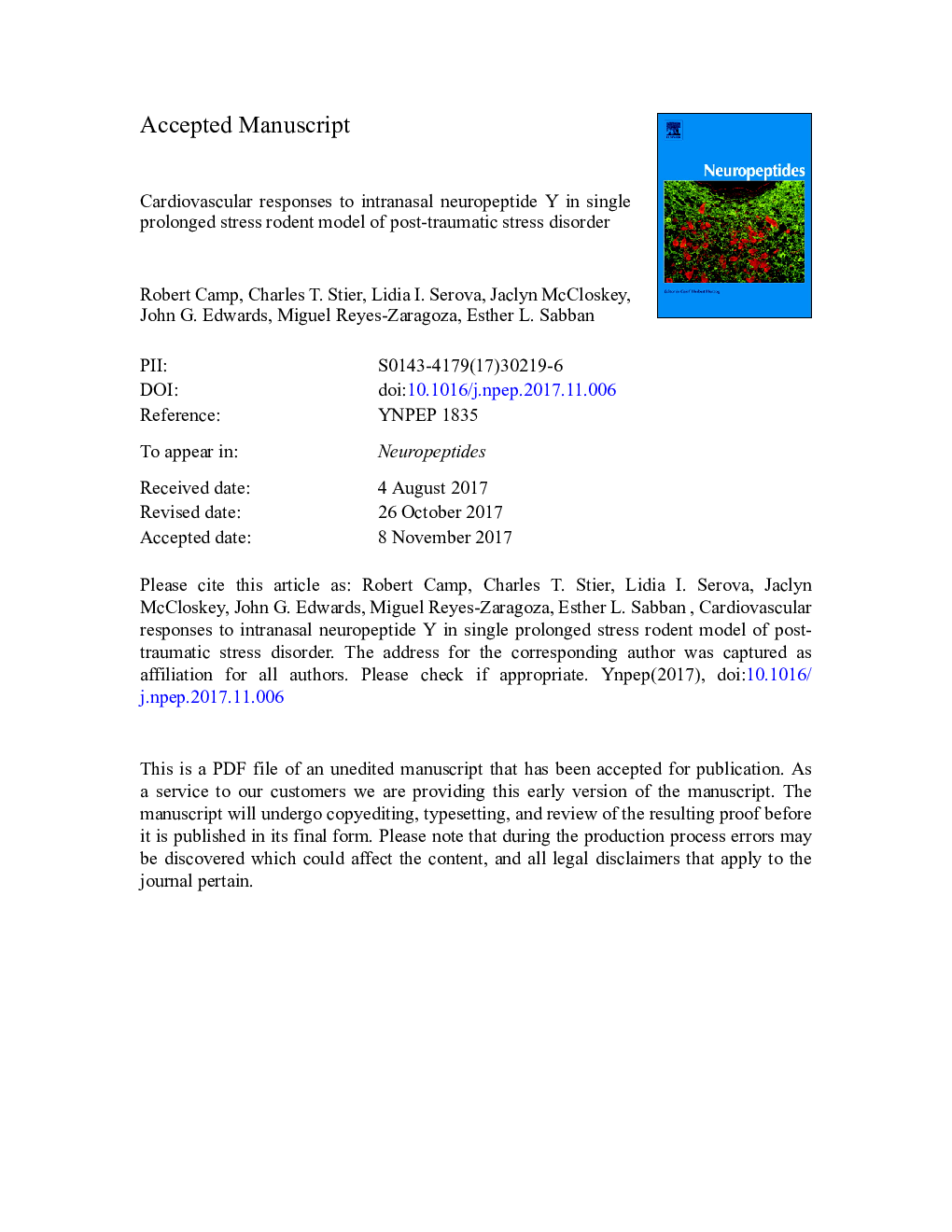| کد مقاله | کد نشریه | سال انتشار | مقاله انگلیسی | نسخه تمام متن |
|---|---|---|---|---|
| 8633348 | 1569055 | 2018 | 38 صفحه PDF | دانلود رایگان |
عنوان انگلیسی مقاله ISI
Cardiovascular responses to intranasal neuropeptide Y in single prolonged stress rodent model of post-traumatic stress disorder
دانلود مقاله + سفارش ترجمه
دانلود مقاله ISI انگلیسی
رایگان برای ایرانیان
کلمات کلیدی
موضوعات مرتبط
علوم زیستی و بیوفناوری
بیوشیمی، ژنتیک و زیست شناسی مولکولی
علوم غدد
پیش نمایش صفحه اول مقاله

چکیده انگلیسی
Delivery of neuropeptide Y (NPY) to the brain by intranasal administration shows promise as non-invasive means for preventing or treating PTSD symptoms. Here, radiotelemetry and echocardiography were used to determine effects of intranasal NPY on cardiovascular functions in absence and presence of stress. Male adult Sprague Dawley rats were implanted with radiotelemetric probes, and subjected to single prolonged stress (SPS), followed by intranasal vehicle (V) or NPY (150 μg) under conditions shown to prevent development of many of the behavioral neuroendocrine and biochemical impairments. In both groups, mean arterial pressure (MAP) rose rapidly peaking at about 125 mmHg, remaining near maximal levels for 1 h. SPS also elicited robust rise in heart rate (HR) which was mitigated by intranasal NPY, and significantly lower than V-treated rats 12-50 min after exposure to SPS stressors. In the first hr. after SPS, locomotor activity was elevated but only in the V-treated group. By 3 h, MAP returned to pre-stress levels in both groups with no further change when monitored for 6 days. HR remained elevated during the 6 h remaining light phase after SPS. Subsequently HR was at pre-SPS levels during the remaining days. However dark phase HR was low following SPS, gradually recovered over 6 days and was associated with reduced activity. When administered in the absence of further stress, intranasal NPY or V elicited similar much smaller, short-lived rises in MAP and HR. Echocardiography revealed no change in HR, stroke volume (SV) or cardiac output (Q) with intranasal NPY in the absence of stress. SPS led to reduced SV and Q but was not affected by NPY. Overall the results demonstrate no major cardiovascular effects of intranasal NPY and indicate possible benefit from transient amelioration of HR response in line with its translational potential to combat PTSD and comorbid impairments.
ناشر
Database: Elsevier - ScienceDirect (ساینس دایرکت)
Journal: Neuropeptides - Volume 67, February 2018, Pages 87-94
Journal: Neuropeptides - Volume 67, February 2018, Pages 87-94
نویسندگان
Robert Camp, Charles T. Jr, Lidia I. Serova, Jaclyn McCloskey, John G. Edwards, Miguel Reyes-Zaragoza, Esther L. Sabban,